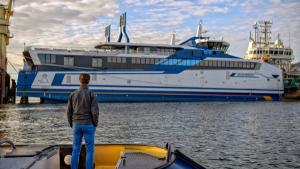In June the new ship MV Willem Barentsz from Rederij Doeksen will be put into service. From that date on it will provide data for the CLINSH monitoring program on emissions. This brand new ship has been completed in recent months in Harlingen and is now almost ready for sea trials. The ship is being used together with the new sister ship MV Willem de Vlamingh to provide the ferry services between Harlingen and the Dutch Wadden Islands Terschelling and Vlieland,
The ships are two identical ropax catamarans that use LNG as fuel. In addition to the fact that the ships provide more car deck capacity at the most desired time of travel, it is at least as important for Rederij Doeksen that the ships are much less harmful to the environment than the current diesel-powered ships. “We operate in the Wadden Sea, a vulnerable and protected nature reserve with Unesco World Heritage status. Our ships have to fit in there,” says Paul Melles, managing director of Rederij Doeksen.
The numbers tell the tale
The opportunity to participate in the monitoring program of the CLINSH project is an excellent opportunity for Rederij Doeksen to make the 'greening efforts' measurable. Melles: ‘By participating in the monitoring program of the CLINSH project, we can provide insight into the emissions of our new ships and show that LNG is actually a more environmentally friendly alternative to diesel. Especially if we can use bio-LNG in the future: we can even save up to 80% CO2 without having to adjust the on-board installation”. The results of the emission monitoring of the MV Willem Barentsz are expected in the second half of 2020.
Less emissions with LNG
Environmentally friendly trading is one of the core values of Rederij Doeksen and occupies a central position in the operational management. In accordance with the mission, customer demand, shareholder requirements and current concession, they investigated various environmentally friendly propulsion methods for future ferries. The choice fell on LNG as a fuel: LNG not only gives less emissions, it is also cleaner for the engine. In practice, it appears that an LNG engine requires less maintenance than a diesel engine.
Compact fuel
Because Vlieland and Terschelling are the furthest from the coast of all Dutch Wadden Islands, the fact that LNG is a very compact fuel is a major advantage: the range of a ship running on LNG is considerably greater than that of a ship running on CNG, for example. The compactness also has a positive effect on transport and storage.

